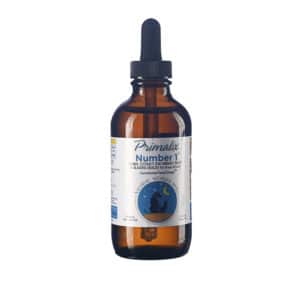Dog Urinary Tract Infection or Cat UTI
Nature's only urge is toward wellness.
Dog urinary tract infection (and cat UTI) "Seldom if ever found in healthy pets whose natural defenses are functioning as Nature intends."
Urinary tract infections, or UTIs, are painful and inconvenient for your pet, and frustrating for you. A cat or dog urinary tract infection results in your pet having accidents in the house or constantly pestering you to be allowed out. Urinary tract infections are not just an uncomfortable inconvenience. Infections can spread through the urinary tract and lead to further infections in the kidney or even result in sepsis of the blood. Ongoing UTIs can lead to bladder and kidney stones, which can result in lethal blockages.

What is a Urinary Tract Infection?
A urinary tract infection is a bacterial infection that occurs anywhere along your pet’s urinary tract. The infection may occur in the urethra, bladder, or kidneys. Often, the infection starts in the lower urinary tract when bacteria in the intestine gets into the urethra. Both dogs and cats can get these infections, and they occur in both male and female animals.
Some breeds are more prone to urinary tract infections and bladder stones than others, and the condition is more common in older animals or animals with adrenal disorders or diabetes. Urinary tract infections are more likely to develop in animals that are forced to hold their urine too long or are unable to thoroughly empty the bladder, such as animals with reduced bladder tone or paralysis. Dogs and cats that don't drink enough water or have infrequent chances to urinate are more likely to develop urinary tract infections.
Cat and Dog Urinary Tract Infections and Bladder Stones
Urinary tract infections and bladder stones go hand in hand. Chronic urinary tract infections often lead to bladder stones or crystals. A urinary tract infection may also be an indication of a bladder stone, as bladder stones or crystals tend to lead to urinary tract infections. Bladder stones are a serious condition which must be treated immediately since they can block the urethra and prevent urination, which is life-threatening.
Straining or discomfort during urination is one of the first signs of a urinary tract infection. You may notice that your dog postures for longer than usual or your cat is in the litter box for a long time. Your pet may posture several times without urinating very much or not at all. Your pet may also cry or vocalize while straining to urinate.
Frequent, unproductive urination is another classic sign of a cat or dog urinary tract infection. Your dog or cat may posture again and again, producing only a very small amount of urine. Your pet may be unwilling to come in even after having urinated several times. Alternately, some pets with a urinary tract infection may produce an abnormally large amount of urine at one time and be unable to urinate at other times.
Inappropriate urination inside the house or cats refusing to use a clean litter box are other indications of a cat or dog urinary tract infection. Your pet may not be able to control when or how much she urinates, leading to random accidents inside the house even after your dog has just gone out or your cat has just visited the litter box.
Cloudy, strong-smelling urine is another clear indication of a UTI. A healthy cat or dog’s urine may be concentrated dark yellow to almost clear depending on how much water your pet has been drinking. Regardless of the color, urine will be clear in a healthy pet. Another indication of a cat or dog urinary tract infection is the urine will have a cloudy, translucent appearance no matter the color. It will likely have a strong and unpleasant odor. There may also be discharge around the urethra.
Increased thirst may also indicate a cat or dog urinary tract infection, especially when paired with one of the previous symptoms. If your pet has increased thirst without any of the other symptoms of urinary tract infection, it is more likely that a different disease is the culprit.
Conventional Treatment for Cat and Dog Urinary Tract Infections
Your veterinarian can test your pet's urine for signs of infection and to identify the type of infection present. Your veterinarian will then prescribe the correct type of antibiotic to attack the bacteria in your pet's urine. This can be a difficult process, as sometimes there are more bacteria present than the veterinarian identifies at first, causing antibiotics to be ineffective or only partially effective.
In these cases, another antibiotic will be prescribed to attack whatever bacteria was left over after the first treatment. This means that your dog receives multiple doses of different antibiotics, which may make bacteria in the urine more resistant to antibiotics in the future. Dogs and cats that experience chronic urinary tract infections and are constantly treated by antibiotics become harder and harder to treat with every new infection.
Natural Herbs for Better Plumbing
Thankfully, there is a natural way to condition pets so that their natural defenses can attack cat or dog urinary tract interruptions, and it won’t yield antibiotic-resistant bacteria. Primalix Number 1 can nourish and balance your pet’s urinary tract while empowering your pet’s natural healing ability by optimizing the immune system.
Natural Remedy for Dog and Cat UTI
- Primalix Number 1 is an effective herbal remedy for optimizing animal biological defenses that naturally remedy conditions causing cat or dog urinary tract infection
- Does not cause the bacteria-resistant mutating problems associated with conventional antibiotics
- Easy to use Functional Food Drops can be added to dry, wet, or raw food or given orally to your pet
- A healthy urinary tract prevents the buildup of sediment that results in bladder and kidney stones
- Blend of herbal ingredients have been used historically and clinically tested
Natural Ingredients
Echinacea Angustifolia is at the top of the list of powerful herbs used historically and in today's herbal clinics against infections of all kinds. The standard treatment for infection before the rise of antibiotics, it is still approved by the government of Germany to treat urinary tract infections as well as other types of infections. This multifunctional herb is used in many countries to relieve pain and inflammation. It boosts the immune system to help the body fight off infection. A recent Belgian study found that the frequent and painful urination caused by urinary tract infections was greatly improved by using Echinacea.
Uva Ursi (Arctostaphylos uva ursi) has been used for centuries by Native Americans to treat urinary tract infections. The leaves of this plant contain arbutin, which converts to hydroquinone in the urinary tract. This powerful antiseptic then fights off the cat or dog urinary tract infection. Uva Ursi also contains astringent tannins which shrink mucous membranes to reduce inflammation, making urination easier. Its diuretic properties are useful for flushing bacteria out of the kidneys.
Goldenrod (Solidaginis virguarea) has been used for centuries to cure human and dog urinary tract infections throughout Europe, Asia, and North America. Medical herbalists use it it for its multiple beneficial effects including anti-inflammatory, antimicrobial, analgesic, and diuretic. Each of these traits is beneficial when fighting a urinary tract infection. Goldenrod is also effective at preventing the formation of stones in the bladder or kidneys because it removes urinary sediment.
Marshmallow Root (Althea Officinalis) produces a glue-like substance called mucilage which can be used to coat the body's mucous membranes. Marshmallow root soothes irritation in the mucous membranes of the urinary tract and reduces inflammation. This herb encourages phagocytosis, the process by which cells absorb and destroy unwanted microorganisms in the blood, preventing infections from developing.
Our alcohol-free Glycerites provide up to 5 times more gut absorption than most pills, tablets, or granules.
Apple Cider Vinegar is used in our proprietary extraction solvent that extracts and preserves the medicinal constituents of the herbs. Not only is apple cider vinegar effective as a solvent and preservative, it is itself a powerful agent against harmful microorganisms and a natural detoxicant.
Recommended Products
Key Benefits
- Non-steroidal: free of short and long-term steroidal side effects
- Used for immediate support - ideal for long term dietary maintenance
- Easy to add to your dog's feeding routine
- Keeps your dog safe from drugs while nourishing and fortifying the adrenal glands
Dosing Instructions
- Administer by mouth on an empty stomach, or add to food.
- Cats and small dogs (up to 20 lbs.): 1/2 dropper twice daily
- Medium dogs (21 to 60 lbs.): 1 dropper twice daily
- Large dogs (61 to 100 lbs.): 2 droppers twice daily
- Giant dogs (101 lbs. and up) 3 droppers twice daily
- Give daily for 10 days to 2 weeks.
Maintenance: Give daily for 7 days, then withhold for next 3 weeks, or simply give for 1 week out of every month.
NOTE: One "dropper" equals one squeeze of the black bulb (1.0mL), which fills the pipette about half full. Refrigerate after opening.
Every bottle of Primalix Number 1 is guaranteed to meet your complete satisfaction or your money back! Simply return the unused portion to Natural Wonder Products within 30 days for a full refund of your purchase price (less S&H). No hassle, no questions asked. If you’re not happy, we’re not happy!

